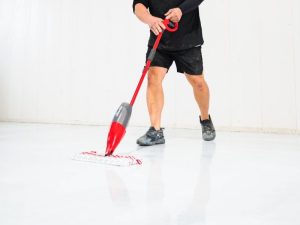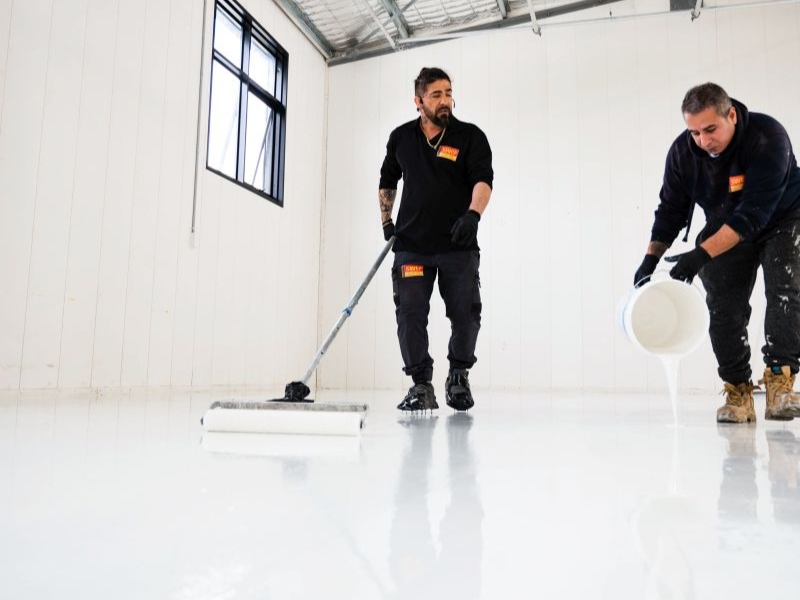When choosing a flooring option that offers both durability and aesthetic appeal, epoxy flooring stands out as a top contender. Whether for a residential garage, a commercial space, or a bustling warehouse, epoxy flooring is known for its ability to withstand heavy use and challenging conditions. But just how durable is epoxy flooring? In this article, we’ll explore the factors contributing to its durability, how it performs in high-traffic and industrial environments, and whether it’s the right choice.
What makes epoxy flooring so resilient?
Epoxy flooring is often praised for its resilience, but what gives it this strength? The durability of epoxy flooring can be attributed to several key factors:
- Chemical composition: Epoxy flooring is created by mixing resin with a hardener, forming a rigid, plastic-like material. This chemical reaction creates a surface that’s strong and resistant to many common threats that other flooring types might succumb to.
- Thickness: The thickness of an epoxy floor can vary depending on its intended use. Thicker applications provide additional strength and durability, making them ideal for environments that experience heavy machinery or frequent foot traffic.
- Adhesion to the substrate: The strong bond between the epoxy and the underlying substrate (often concrete) contributes to its durability. Proper surface preparation ensures the epoxy adheres effectively, preventing issues like cracking or peeling.
- Impact resistance: One of the standout features of durable epoxy flooring is its ability to withstand impacts. Whether tools are dropped in a garage or heavy equipment is in a warehouse, epoxy floors are designed to absorb shock without sustaining damage.
Is it suitable for high-traffic areas?
Epoxy flooring is often chosen for spaces with much movement, but how well does it hold up in high-traffic areas?
- Commercial spaces: In commercial settings like retail stores or offices, durable epoxy flooring can handle the daily wear and tear of foot traffic, furniture movement, and occasional spills. Its non-slip surface adds an extra layer of safety, making it a practical choice.
- Garages: Epoxy flooring is an excellent option for homeowners who use their garages for more than parking cars. It can resist the constant movement of vehicles, tools, and other equipment without showing wear.
- Hospitals and healthcare facilities: Epoxy flooring’s ability to withstand foot traffic and wheeled medical equipment’s movement makes it ideal for healthcare environments. Its easy-to-clean surface also helps maintain hygiene, which is crucial in these settings.
How does epoxy flooring hold up in a warehouse environment?
Warehouses present some of the most challenging conditions for flooring.
- Heavy machinery: Warehouses often house forklifts, pallet jacks, and other machinery. Epoxy flooring is designed to endure this equipment’s weight and constant movement without cracking or deteriorating.
- Foot traffic: Besides machinery, warehouses also see significant foot traffic from workers. Epoxy floors provide a durable surface that can handle the daily grind without showing signs of wear.
- Temperature fluctuations: Warehouses may experience varying temperatures depending on the goods stored and the season. Epoxy flooring resists temperature changes, ensuring it remains intact without expanding or contracting.

Epoxy flooring is renowned for its toughness, but proper installation is critical to unlocking its full potential. Explore flooring installation training options to ensure your warehouse floor stands the test of time.
Can epoxy flooring withstand chemical spills and stains?
One reason epoxy flooring is favoured in industrial and commercial settings is its resistance to chemicals.
- Chemical resistance: Epoxy flooring is highly resistant to various chemicals, including oils, solvents, and acids. This makes it ideal for industries where spills occur daily, such as automotive workshops or manufacturing plants.
- Stain resistance: Epoxy floors do not absorb spills, unlike porous flooring materials like concrete. This means that even if a spill occurs, it can be easily cleaned up without leaving a stain, preserving the floor’s appearance.
- Protection against corrosion: In environments with corrosive substances, durable epoxy flooring provides a protective layer that prevents the underlying concrete from being damaged.
How long does epoxy flooring last?
Longevity is a crucial factor to consider when investing in flooring.
- Lifespan: Epoxy flooring is known for its long-lasting nature. Depending on the environment and level of traffic, it can last 10 to 20 years or more, making it a cost-effective option in the long run.
- Maintenance: Proper maintenance plays a significant role. Regular cleaning and occasional re-coating can extend its life and ensure it continues to perform well over the years.
- Resistance to wear and tear: Unlike some other flooring options, epoxy doesn’t wear down quickly. Its resistance to scratches, impacts, and chemical spills means it retains its integrity and appearance for many years.
Is it easy to maintain in a warehouse setting?
Maintenance is a crucial consideration when choosing flooring for a warehouse.
- Ease of cleaning: One of the significant benefits of epoxy flooring is its ease of cleaning. This can be a considerable advantage in a warehouse where dust, dirt, and spills occur daily. Regular sweeping and occasional mopping are all needed to keep the floor in good condition.
- Low maintenance requirements: It requires little maintenance. Unlike other flooring options that may need frequent sealing or polishing, durable epoxy flooring remains in good shape with minimal upkeep.
- Resistant to damage: The robust nature of epoxy flooring means it’s less likely to suffer from damage that would require repairs. This is particularly important in a warehouse environment, where repair downtime can be costly.

Should you choose epoxy flooring for your warehouse?
Given all the factors discussed, is epoxy flooring the right choice for your warehouse?
- Cost-effectiveness: While the initial installation of epoxy flooring may be more expensive than some other options, its durability and low maintenance make it a cost-effective solution in the long term.
- Safety: Epoxy flooring’s non-slip properties add an extra layer of safety, which is crucial in a warehouse environment where accidents can happen.
- Aesthetic appeal: Epoxy flooring isn’t just functional; it’s also visually appealing. It can be customised in various colours and finishes, allowing you to create a look that suits your space while maintaining durability.
Invest in long-lasting flooring today
If you’re in Sydney and considering a flooring option for your warehouse, Sydney Wide Epoxy Flooring offers high-quality epoxy flooring solutions tailored to your needs. With a focus on durability and customer satisfaction, they provide flooring that looks great and stands the test of time. Contact Sydney Wide Epoxy Flooring today to learn how durable epoxy flooring can benefit your warehouse.

